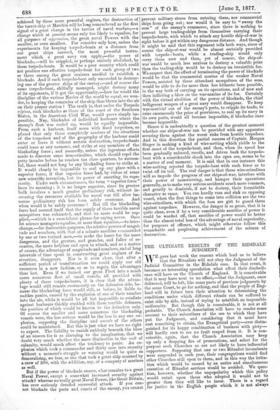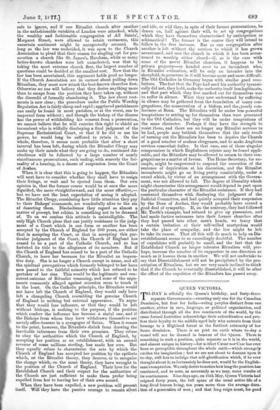THE ULTIMATE RESULTS OF THE RIDSDALE .TUDGMENT.
gave last week the reasons which lead us to believe that the Ritualists will not obey the Judgment of the Judicial Committee in the Ridsdale case. In that event, it becomes an interesting speculation what effect their disobedi- ence will have on the Church of England. It is conceivable that it may have next to no effect,—that the Judgment, once delivered, will be left, like some parts of previous judgments by the same Court, to go for nothing, and that the people of Eng- land will in future turn their attention to determining the conditions under which different rituals can be suffered to exist side by side, instead of trying to establish an impossible uniformity. But though this is conceivable, it is not at all probable. The Church Association will have to render some account to their subscribers of the use to which they have put the Judgment, and considering that it must have cost something to obtain, the Evangelical party—ever distin- guished for its happy combination of business with piety— will hardly care to see no fruit reaped from it. It is con- ceivable, again, that the Church Association may keep up only a dropping fire of prosecutions, and select for the purpose such Churches as are not likely to have influential supporters. Supposing that one or two Ritualist incumbents were suspended in each year, their congregations would find other Churches still open to them, and in this way the irrita- tion which would be caused by an entire and simultaneous cessation of .Ritualist services would be avoided. We ques- tion, however, whether the unpopularity which this policy would entail upon those who adopted it would not be greater than they will like to incur. There is a regard for justice in the English people which it is not always safe to ignore, and if one Ritualist church after another in the unfashionable outskirts of London were attacked, while the wealthy and fashionable congregation of All Saints', Margaret Street, were allowed to retain vestments, this uncertain sentiment might be unexpectedly aroused. So long as the law was undecided, it was open to the Church Association to plead that their reason for singling out for pro- secution a church like St. James's, Hatcham, while so many better-known churches were left unmolested, was that by taking the most extreme church first, the largest number of questions could be decided at the smallest cost. Now that the law has been ascertained, this argument holds good no longer. If the Church Association are in earnest about pulling down Ritualism, they must now attack the best-known churches first. Otherwise no one will believe that they desire anything more than to escape from the position they have taken up, without the discredit of formally abandoning it. The law about vest- ments is now clear; the procedure under the Public, Worship Regulation Act is fairly cheap and rapid ; aggrieved parishioners can easily be found in most parishes, or at the worst, can be imported from without ; and though the bishop of the diocese has the power of withholding his consent from a prosecution, we cannot believe that he will exercise this right to shield an incumbent who is wilfully disobeying a final judgment of the Supreme Ecclesiastical Court, or that if he did so use his power, he would long be suffered to retain it. On the whole, therefore, it seems most probable that after a short interval has been left, during which the Ritualist Clergy may make up their minds what they are going to do, continued dis- obedience will be followed by a large number of nearly simultaneous prosecutions, each ending, with scarcely the for- mality of a hearing, in a decree of suspension from the Court of Arches.
When it is clear that this is going to happen, the Ritualists will next have to consider whether they shall have to resign their livings, or wait and be ejected from them. Our own opinion is, that the former course would be at once the more dignified, the more straightforward, and the more effective,— but we have not the least expectation of seeing it adopted. The Ritualist Clergy, considering how little attention they pay to their Bishops' commands, are wonderfully alive to the sin of deserting them. Disobedience they regard as almost a matter of precept, but schism is something not to be dreamed of. To us we confess this attitude is unintelligible. The only High Church pleas that can justify resistance to the judg- ment of a Court which in one form or another has been accepted by the Church of England for 300 years, are either that in accepting the Court, or that in accepting this par- ticular judgment of the Court, the Church of England has ceased to be a part of the Catholic Church, and so has forfeited its title to the allegiance of its members. But if the Church of England has ceased to be a part of the Catholic Church, to leave her becomes for the Ritualist an impera- tive duty. She is no longer a Church except in name, and all the spiritual prerogatives which formerly belonged to her have now passed to the faithful minority which has refused to be partaker of her sins. This would be the legitimate and con- sistent outcome of Ritualist reasoning, and none of the argu- ments commonly alleged against secession seem to touch it in the least. On the Catholic principle, the Ritualists would not have left the Church of England, ;hey would only have left a changeling Church resembling the genuine Church of England in nothing but external appearance. To argue that they would lose influence, or that they would be left without bishops, is nothing to the purpose, if the position which confers the influence has become a sinful one, and if the Bishops from whom they have withdrawn themselves are merely office-bearers in a synagogue of Satan. When it comes to the point, however, the Ritualists shrink from drawing the inevitable inferences from their own premises. They refuse to obey the authorities which the Church of England, by accepting her position as an establishment, with an annual revenue of some millions sterling, has made her own. But they equally refuse to characterise the acts by which the Church of England has accepted her position by the epithets which, off the Ritualist theory, they deserve, or to recognise the chapge which, on the same theory, they have wrought in the position of the Church of England. Their love for the Established Church and their respect for the authorities of the Church are just sufficient to make them prefer being expelled from her to leaving her of their own accord.
When they have been expelled, a new problem will present itself. Will they have the passive courage to remain silent and idle, or will they, in spite of their former protestations, be drawn on, half against their will, to set up congregations which they have themselves characterised by anticipation as schismatical ? The former is the course they will intend to follow in the first instance. But as one congregation after another is left without the services to which it has grown accustomed, and sees the church in which it has been accus- tomed to worship either closed—if, as is the case with some of the newer Ritualist churches, it happens to be private property—or handed over to an incumbent who, in Ritualist estimation, will be only an intruder into the sheepfold, to persevere in it will become more and more difficult. The Old Catholics in Germany began with similar good reso- lutions. The fact that the Pope had used his authority tyranni- cally did not, they hold, make the authority itself less legitimate, and that part which they first marked out for themselves was to suffer in silence. What they now understand by suffering in silence may be gathered from the foundation of many con- gregations, the consecration of a bishop, and the iyearly con- ferences at Bonn. The Ritualists will be under less powerful temptations to setting up for themselves than were presented to the Old Catholics, but they will be under temptations of the same character. Perhaps if they have the strength to resist them, and there are no longer any Ritualist services to be had, people may bethink themselves that the only result of turning out the Ritualists has been to deprive the Church of a good number of zealous clergymen, and to make Anglican services somewhat duller. In that case, one of those singular compromises in which Englishmen rejoice may be found appli- cable, and the Ritualists may be allowed to return to their con- gregations as a matter of favour. The Home Secretary, for ex- ample, might be empowered to suspend the execution of the sentence of deprivation at his discretion, and the Ritualist incumbents might go on living pretty comfortably, under a sword which, by virtue of an arrangement with the Govern- ment, was not allowed to fall. The degree of liberality which might characterise this arrangement would depend in part upon the particular character of the Ritualist resistance. If they had contented themselves with disobeying the judgment of the Judicial Committee, and had quietly accepted their suspension by the Dean of Arches, they would probably have earned a good deal of sympathy. If, on the contrary, they had followed Mr. Tooth's example, had refused to give up possession, and had made furtive entrances into their former churches after they had passed into other men's hands, we fancy that a certain irritation at their self-willed martyrdom would take the place of sympathy, and the law might be left to take its course. That all this will do much to help on Dis- establishment seems to us exceedingly doubtful. The number of expulsions will probably be small, and the fact that the Established Church no longer tolerates Ritualism will, per- haps, increase the number of its supporters in one direction as much as it lessens them in another. We will not undertake to say that Disestablishment will not be precipitated by the pro- scription of Ritualism, but we are very much inclined to think that if the Church be eventually disestablished, it will be after the effect of the expulsion of the Ritualists has passed away.



































 Previous page
Previous page